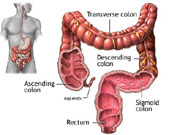Mens Womens Health
Life Is Short... Live Well! We Can Help!
How to Reduce Your Risk of Colorectal Cancer

Are you familiar with colorectal cancer? It's a devastating form of cancer that has had a huge impact on my life. Hopefully you will never have to endure even learning about the condition. But, if you have experienced it or are in the process of dealing with it, this page might be a good reference for your family members.
First, it's important to understand that the term "colorectal cancer" is used to refer to all cancers in the colon and the rectum. They are one of the most common cancers in the whole world. As you may already know, both the colon and rectum are part of the digestive system. The colon works by re-absorbing huge amounts of water as well as nutrients from undigested foods which pass through it. On the other hand, the rectum is at the end of the colon where the waste material is stored before it goes out of the body.
Symptoms
When a person has colorectal cancer, he or she may experience the following symptoms:
1. Change in bowel habits (person may suffer from constipation, diarrhea, or a feeling that the bowel isn't functioning well)
2. Bloody stools
3. Unexplained weight loss
4. Exhaustion
5. Vomiting
6. Abdominal discomforts such as feeling of fullness, bloating, or pain
It is best to see a doctor once you or someone you know experiences these symptoms. Remember that though they are typical signs of colorectal cancer, they can be symptoms of other conditions too. That said, it is imperative to see a doctor for a proper diagnosis.
Causes
It would be a lot easier to know how to reduce your risk of colorectal cancer if you knew the causes, right? However, just like other types of cancer, the exact origin of the illness is unknown. What experts can just say is that there are people who are more prone to having it than others. Here's a list of the factors you should be familiar with:
Age
Elderly people are more prone to having colorectal cancer
Diet
Those who keep a diet which is high in calories, saturated fats, and protein but low in fiber can also have the cancer more easily. Those who drink a lot of alcoholic beverage are at a higher risk too.
Heredity
People who have family members who were diagnosed with the illness.
Past cancer history
Women who had cancer in the ovary, uterus, or breast.
Presence of polyps
Polyps are abnormal growths or on the inner wall of the colon or rectum. Although benign, not treating them may lead to cancer in the future.
Ulcerative Colitis
This is a condition when the lining of the colon becomes inflamed. People with it also have a higher risk of colorectal cancer.
Prevention
If there's any consolation, about 90 percent of colorectal cancers and deaths are said to be preventable. This is why you should get screened often once you reach the age of 45. My doctor recommends once a year unless some in your family had a bout with this form of cancer. If you have had some genetic relatives that experienced this, doctors recommend a screening every six months.
Apart from regular screenings, maintaining a healthy weight, and exercising regularly, you can reduce your risk of having the cancer by the following:
Eat a healthy and well-balanced diet
Stop smoking
Stop drinking alcoholic beverages
Reduce fat consumption, especially animal fat
Cut down on the amount of processed foods that you eat
Increase on fiber consumption (cereals, fresh fruits, and vegetables)
Take a low dose of aspirin (it is said to reduce the development of polyps. However, you should still check with the doctor first)
Take calcium supplements
Increase Vitamin D ( go out in the sun or have some oily fish)
An occasionally cleansing has been theorized to help, but there is little scientific evidence to support this theory.
It's all about the digestive system, remember this. If you take care of your digestive system you will reduce your chances of having issues. As the cliché goes, "Prevention is better than cure." How to reduce your risk of colorectal cancer may not be fully in your hands, however, there are practical things you can do about it. If you they can help, then why not do them?
